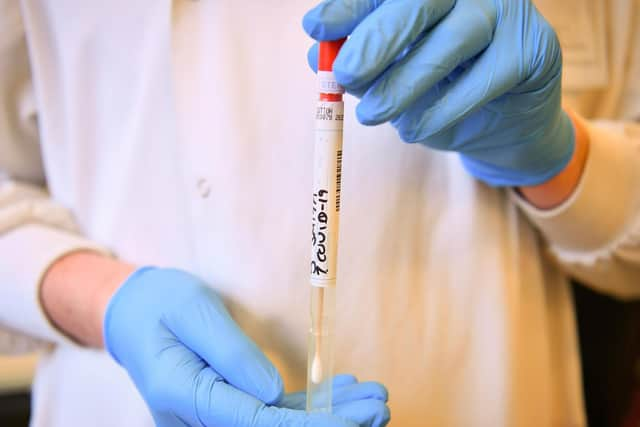Further 25 coronavirus deaths announced at Yorkshire hospitals as Oxford vaccine dubbed ‘winning formula’
NHS England confirmed the deaths in figures released on Sunday, December 27.
It releases updated figures each day showing the dates of every coronavirus-related death at hospitals in England, often including previously uncounted deaths that took place several days or even weeks ago.
Deaths occurred at the following hospital trusts.


Barnsley Hospital NHS Foundation Trust - 2
Calderdale and Huddersfield NHS Foundation Trust - 2
Hull University Teaching Hospitals NHS Foundation Trust - 1
Mid Yorkshire Hospitals NHS Trust - 3
Northern Lincolnshire and Goole NHS Foundation Trust - 3
The Rotherham NHS Foundation Trust - 2
Sheffield Teaching Hospitals NHS Foundation Trust - 9
York Teaching Hospital NHS Foundation Trust - 3
Advertisement
Hide AdAdvertisement
Hide AdThe current Covid death toll in Yorkshire hospitals is now 5,804.
The total across Leeds hospitals is 670 deaths.
Across England, a further 231 people who tested positive for coronavirus have died in hospital, bringing the total number of confirmed deaths reported in hospitals to 48,542, NHS England said on Sunday.
Patients were aged between 30 and 103. All except five, aged between 36 and 85, had known underlying health conditions.
The deaths were between December 9 and 26.
There were 10 other deaths reported with no positive Covid-19 test result.
Advertisement
Hide AdAdvertisement
Hide AdIt comes as the boss of the firm behind the Oxford/AstraZeneca Covid-19 vaccine raised hopes it is more effective than first thought, amid the rapid spread of the UK virus strain across the globe.
AstraZeneca chief Pascal Soriot told the Sunday Times he believed researchers had found the “winning formula” using two doses and promised to publish the results as reports suggested the UK regulator could approve the jab within days.
The claim will come as some relief even as Canada became the latest country to identify cases of the new highly infectious variant of coronavirus, which was first detected in the UK and has since spread to at least a dozen countries.
And Chancellor Rishi Sunak praised vaccination efforts so far, telling the Mail on Sunday: “There will be tough days and months ahead, but there are reasons to look ahead to a brighter future and what 2021 promises.
Advertisement
Hide AdAdvertisement
Hide Ad“The early roll-out of vaccines – and the incredible work of our scientists and NHS – means we can now see light at the end of the tunnel with this pandemic.”
But medical unions and Labour criticised the Government’s handling of the programme, which they said had not made enough progress in care homes.
Nadra Ahmed, chairman of the National Care Association, told the Sunday Mirror the Pfizer/BioNTech roll out was going to be “difficult” but added: “It’s another case of the massive over-promise on something that just cannot be delivered. It’s constant.”
And Labour shadow health secretary Jonathan Ashworth told the paper there was a “race against time” to vaccinate enough people as he urged the Government to avoid what he said were “the same mistakes again” in being “too slow” to protect care home residents – a veiled reference to PPE and hospital discharges.
Advertisement
Hide AdAdvertisement
Hide AdOn Christmas Eve, the Department of Health and Social Care said more than 600,000 people had received their first dose of a Covid-19 vaccine, but the roll-out in care homes has been limited to seven areas.
It added larger care homes with 50 to 70 beds would be prioritised first, with around 2,900 care homes of this size in England.
The new variant, which was blamed for soaring rates across the country before the wider imposition of stricter Tier 4 measures in swathes of England on Boxing Day, continues to drive high case rates with another 34,693 reported on Saturday.
Cases of the variant strain have been confirmed across Europe including in France, Spain, Denmark, Italy, Iceland, Switzerland, Sweden and the Netherlands, as well as around the globe in Australia, Japan and Lebanon.
Advertisement
Hide AdAdvertisement
Hide AdAs new lockdown measures came into force on Boxing Day, the annual sales rush looked to have suffered a sharp decline with high streets and city centres in the worst hit areas deserted.
More than six million people in east and south-east England went into the highest level of restrictions, which now affects 24 million people representing 43% of the population.
Areas that moved to Tier 4 are Sussex, Oxfordshire, Suffolk, Norfolk and Cambridgeshire, parts of Essex not yet in the highest tier, Waverley in Surrey and Hampshire, with the exception of the New Forest.
Tier 4 restrictions include a warning to stay at home, a limit on household mixing to two people outdoors and force the closure of many shops, hairdressers and gyms.
The measures come on top of Tier 3 restrictions such as the closure of pubs and restaurants except for takeaways and deliveries.